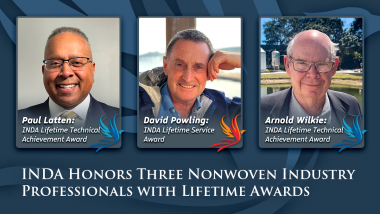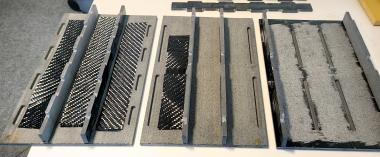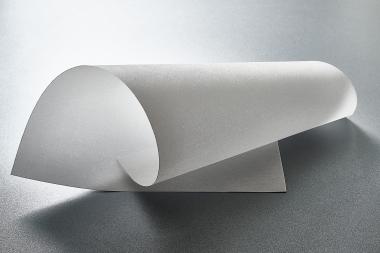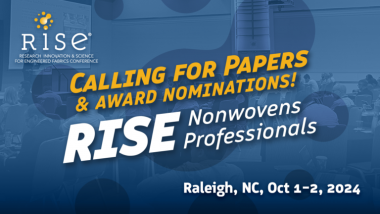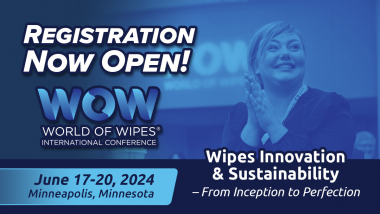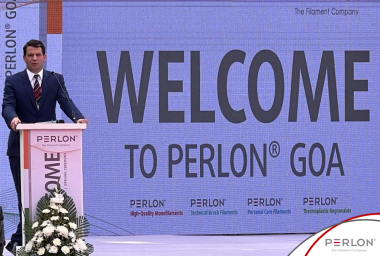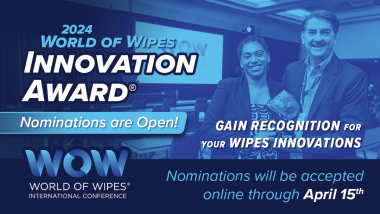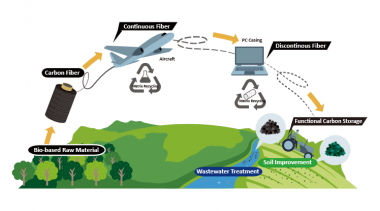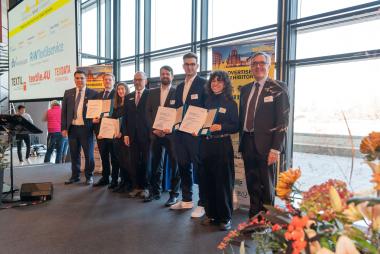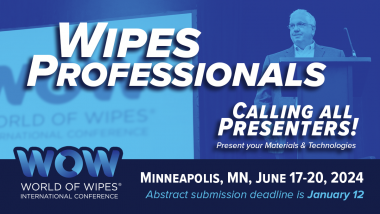INDA Honors Three Nonwoven Industry Professionals with Lifetime Awards
INDA, the Association of the Nonwoven Fabrics Industry, announced three recipients for the INDA Lifetime Service Award and Lifetime Technical Achievement Awards. David Powling, Paul Latten, and Arnold Wilkie are being recognized for their key contributions to the advancement of the nonwovens industry and INDA.
David Powling and Paul Latten will receive their awards at the World of Wipes® (WOW) International Conference, June 18th beginning at 4:30 pm
Arnold Wilkie will receive his award at the RISE® Conference, October 1st at 4:30 pm.
The Award recipients are:
David Powling
David Powling has worked for Kimberly-Clark Corporation for nearly 25 years and has been a contributor to the Wipes Task Force and Technical Committees at INDA and EDANA for over 15 years. Powling served as Chairman of the INDA Wipes Task Force from 2009-2013. His work on these committees include developing the first and second edition of the Flushability Guidance Document (GD) and he was later instrumental in the roll out of the third and fourth edition GDs. Throughout this time, Powling coordinated activities with Kimberly-Clark Corporation to provide critical supporting data, as these flushability test protocols were developed.
Powling has been actively involved in collection studies where he was key in framing the work packages of those studies, collating and analyzing the data, and drafting reports. These collection studies include: Moraga, CA (advisor); Maine – Part #1 and Part #2 (hands-on); Jacksonville (hands-on); and the Northern and Southern California studies in 2023, which combined, was the largest study to date. Powling led the charge in the California study and was personally involved in identifying 1,745 samples.
Powling has been a key technical contributor to the INDA Government Relation efforts that has resulted in labelling regulations in multiple U.S. states. He has also been an active participant in efforts to develop an ISO standard for flushable products. In this effort, he was a test method sub-team leader during the preparation of the proposed ISO standard responsible for organizing appendices of existing flushability methodologies. Additionally, Powling has been awarded, or has pending, 25+ U.S. patents, including many covering the development of dispersible wet wipes.
Paul Latten
Paul Latten has been an active member of the nonwoven and fiber industries for over 35 years. Most recently he has led innovation at Southeast Nonwovens, commercializing more than 75 new nonwoven products per year. Prior to joining Southeast Nonwovens, Latten held senior leadership positions with Basofil, Consolidated Fibers, Invista, and KoSa (and Trevira and Hoechst Celanese precursors to KoSa.)
Latten has a successful career of reinvigorating company R&D efforts by instilling a focus on customer-centric innovation. He is an inventor of record for a number of patents and pending applications. Latten has given numerous presentations on innovative nonwoven materials, at events such as INDA’s World of Wipes® (WOW) International Conference, RISE® (Research, Innovation & Science for Engineered Fabrics), the VISION International Conference, and the Converting and Bonding (CAB) Conference.
His recent innovations have been diverse in scope and include nonwovens for use in hydrogen fuel cells, moisture detection media, proprietary wipe designs, and natural fiber-based packaging. Aside from new fiber and nonwoven products, Latten has championed process innovation that has resulted in tangible output gains that broadened the market opportunity for his current and prior companies.
Latten’s portfolio of innovations has spanned across the nonwoven markets, often involving wetlaid and drylaid nonwovens. These include materials for moisture detection, synthetic papers, fuel cell cathodes, protective covers for treats, melamine nonwovens for surface treatment, and the development of binder fibers. His work also touched upon disposable hygiene applications entailing dry-laid web containing hollow synthetic fibers to improve absorbent core fluid uptake.
Latten has been a board member of INDA for multiple terms and served as Chairman in 2008-2010. Additionally, he has contributed to many INDA conference planning committees, helping drive the success of these events.
Arnold Wilkie
Arnold Wilkie has a distinguished career in advancing yarn, fiber, and nonwoven technologies since 1970. Since 1988, he has been President and Owner of Hills, Inc. where he has sustained their innovative culture. Wilkie has over 40 patents and applications covering yarns, bicomponent fibers, ultra-fine fibers, nanofibers, dissolvable filaments, meltblown nonwovens, and polymer processing innovations. He established Hills as a leading innovator in bicomponent fiber nonwovens and in the equipment to produce these materials. During Wilkie’s time leading Hills, their pilot capabilities have become well-known and highly regarded for enabling material innovations.
Many of his patents pertain to the development of equipment solutions that enable the production of complex bi- and multi-component fiber structures. These solutions include the method of forming a continuous filament spun-laid web, the method and apparatus for producing polymer fibers and fabrics including multiple polymer components, the method and apparatus for controlling airflow in a fiber extrusion system, and controlling the dissolution of dissolvable polymer components in plural component fibers.
Arnold Wilkie, President, Hills, Inc., earned his bachelor’s degree in Mechanical Engineering from the University of Tennessee and an MBA from the University of West Florida. He is a licensed Professional Engineer in Florida, and has been engaged in the synthetic fibers industry since 1970. The first 17 years were with the Monsanto Company, where he held positions in Fiber Process Engineering, Fiber Product R&D, and Product Management. Since 1988, he has been a majority Owner and President of Hills, Inc., a 52-year-old company located in West Melbourne, Florida, specializing in the development, manufacture, and supply of advanced custom fiber extrusion equipment. Wilkie has been involved with and supported The Nonwovens Institute, since its founding in 1991 as the Nonwovens Cooperative Research Center (NCRC), with Hills joining as a Member in 2001
INDA


